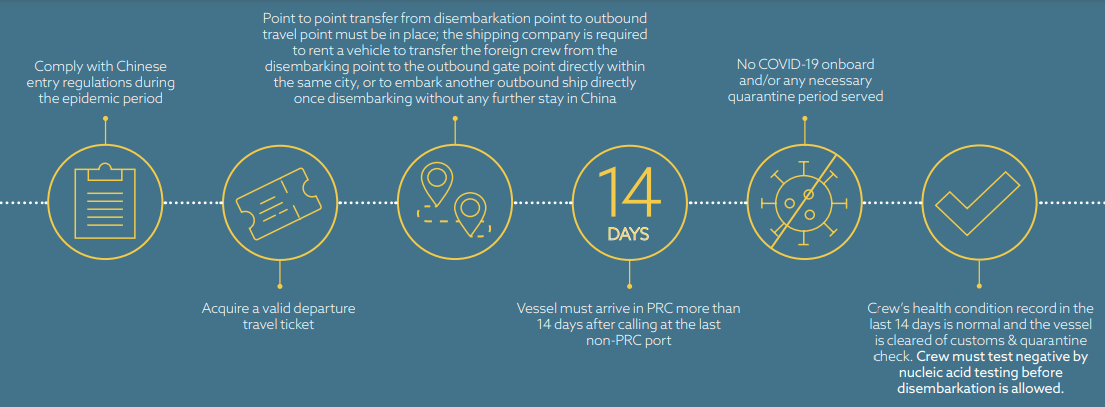Amid COVID-19 pandemic and the major disruption that has brought within industries, North Club issued a report highlighting the challenges arising when trading to the People’s Republic of China (PRC).
To begin with, Chinese authorities have introduced a COVID-19 protocol for ships arriving at PRC ports, as two of the key components of this protocol are the following:
- Confirmed or suspected COVID-19 onboard
If a crew member tests positive or has symptoms of COVID-19 prior to arriving at a PRC port, this must be
reported. The vessel may be denied permission to enter Chinese waters until the affected crew has been
disembarked. If the ship is allowed to proceed to port, quarantine awaits. - The 14-day rule
All crewmembers who have joined the vessel within 14 days of arrival at a PRC port must be tested for COVID-19 upon arrival. For example, should a vessel divert to the Philippines for a crew change before arrival at a PRC port, the new crew are likely to be tested on arrival.
The authorities’ reaction to a positive test can differ from port to port but it is common for affected crew to be placed under quarantine ashore at the Member’s expense. Additionally, the vessel is likely to be placed in quarantine for a period of at least 14 days.
…as North Club stated.
Cargo Operations Under Quarantine
When it comes to cargo trading onboard a quarantined vessel, such operations might be permitted depending on the cargo and the port. Although, authorities may decide to suspend cargo operations at all.
It may also be required the quarantine of any shoreside personnel (including stevedores) that have boarded the vessel or had contact with the crew.
In fact, this quarantine is for a minimum period of 14 days, which is at Member’s expense. There may also be a requirement that the vessel remains at the berth, incurring a daily charge, rather than proceeding to an anchorage.
Crew Changes
To remind, until recently it has not been possible to conduct crew changes in PRC.
However, Chinese authorities have now moved to allow crew changes, subject to certain restrictions.
To be specific, crew changes are permitted at Dalian, Tianjin, Qingdao, Shanghai, Ningbo, Fuzhou, Xiamen, Guangzhou, Shenzhen and Haikou, subject to the following general conditions:
- Comply with Chinese entry regulations during the epidemic period
- Acquire a valid departure travel ticket
- Point to point transfer from disembarkation point to outbound travel point must be in place; the shipping company is required to rent a vehicle to transfer the foreign crew from the disembarking point to the outbound gate point directly within the same city, or to embark another outbound ship directly once disembarking without any further stay in China
- Vessel must arrive in PRC more than 14 days after calling at the last non-PRC port
- No COVID-19 onboard and/or any necessary quarantine period served
- Crew’s health condition record in the last 14 days is normal and the vessel is cleared of customs & quarantine
check. - Crew must test negative by nucleic acid testing before disembarkation is allowed.

In case that a disembarking crewmember tests positive, crew change operations will be suspended for 15 days if a shipping company has five positive tests and 30 days for 10 positive tests.
In the event of more than 10 positive tests, crew change operations by the shipping company will be suspended until reassessment by the relevant authorities.
Delays and cargo delivery issues
In light of the outbreak, there are significant delays which may further arise cargo issues.
Specifically, there are reported cases, where vessels have been compelled to discharge all of its cargo in one port when the bills of lading call for multi-port discharge.
This raises a risk of a claim for delivery at the wrong port or misdelivery, which is outside the scope of International Group standard P&I cover.
In the absence of an express requirement under a charterparty, a carrier cannot be compelled to deliver at a port other than one named in the governing bill of lading.
As North suggests, one solution is to retrieve all original sets of the bills of lading and to switch them for replacement bills of lading which name the new discharge port. A carrier will often want a letter of indemnity in return for agreeing to switch bills.
While, another common commercial solution is for the carrier to accept a letter of indemnity on standard International Group form for requests to delivery cargo at a port other than that stated in the bill of lading.
Explore more herebelow

































































